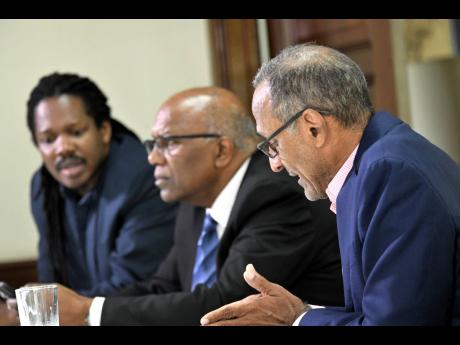Bid to streamline universal coverage and healthcare access
Universal health coverage and universal access are back on the table as the Damien King-led commission gets to work. The question has exercised the minds of succeeding health ministers, especially after 24 years of user fees in public hospitals, the Government of Jamaica introduced a no-user-fee policy at all public health facilities, except the University Hospital of the West Indies, on April 1, 2008. At that time, the Bruce Golding-led government said it was a bid to improve universal access to healthcare at the primary level.
Sector leaders agreed that the removal of user fees has led to better outcomes in terms of so-called, health-seeking behaviour. The result has been that Jamaica’s healthcare system has been groaning under the weight of increased number of patients.
Health Minister Chris Tufton said at last Tuesday’s Gleaner Editors’ Forum that Jamaica’s public-health system caters to three million patients per year, with just over a half of that number utilising the services at the 320 clinics and community hospitals or primary healthcare, and another 1.4 million at public hospitals. Tufton said the government is looking at how to adequately fund and run the healthcare service, given the increasing demand based on more people accessing the system.
DESIRED OUTCOMES
President of the Medical Association of Jamaica, Brian James, said in developing a policy “we ought to be mindful of the desired outcomes”. He said universal coverage does not readily translate to universal access to good-quality healthcare, and that the evidence shows that there is a direct correlation between the health of a population and the level of expenditure in the sector. Any discussion on health-financing policy must start out with general agreement on the key objectives of universal coverage and universal access along with protection for all in society from impoverishment and catastrophic events in health and quality care, he said.
Other panellists at the editors’ forum agreed that the right time for a determination on health sector financing was decades ago. Opposition Senator Damion Crawford estimated that a government-subsidised health insurance scheme would cost about $22 billion. He said the real cost could be less given that government already makes substantial contributions through the National Health Fund (NHF).
“Given that there were some other costs such as the NHF which could be diverted, the net increase would not be the $22m, because government would have been spending on these things in another methodology,” Crawford said.
He also said the desirable health-seeking behaviour could be promoted by the prerequisite of annual check-ups for renewal of their health insurance. Crawford said people could also volunteer to expand the coverage by upgrading the NHF card through personal contributions.

